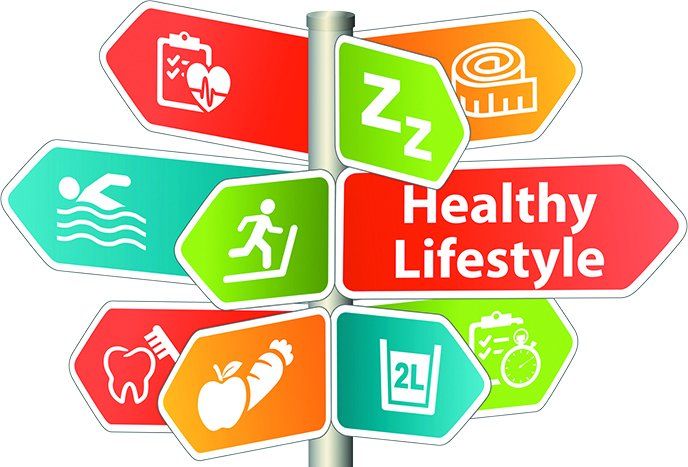[Updated May 4, 2018]
Dreamstime.com

Think you’re destined to get cardiovascular disease since it runs in your family? Take heart. A recent New England Journal of Medicine study suggests a healthy lifestyle may cut risk of heart disease events by about half. Events included heart attack, heart bypass surgery (restoring blood flow to heart muscle) and heart-related death. The drastic reduction was regardless of inherited risk.
“What scientists elegantly showed in this study was that genetic and lifestyle factors contribute independently to cardiovascular disease risk,” says Jos Ordovs, PhD, director of the Nutrition and Genomics Research Lab at Tufts’ HNRCA but not involved in the study. “This means that although a high genetic tendency increases risk of heart disease, an unhealthy lifestyle also increases heart disease risk – beyond a person’s genetic risk. Fortunately, the opposite is also true: A healthy lifestyle can decrease the risk of heart disease, especially for those with high genetic risk.”
Making Healthy Food Choices
People in the study were considered to have a healthy dietary pattern if they met at least half of these criteria:
1. 3 or more servings of vegetables daily (non-starchy)*
2. 3 or more servings of fruits daily*
3. 1 or more servings of nuts per week*
4. 2 or more servings of fish per week*
5. 2 or more servings of dairy products daily*
6. 3 or more servings of whole grains daily*
7. Limit of 1 servings of refined grains daily
8. Limit of 1 serving processed meat per week
9. Limit of 1 servings unprocessed red meat weekly
10. Limit of 1 sugar-sweetened beverage per week
11. No more than 2,000 milligrams sodium daily**
12. Low trans fat intake**
Generally, a serving is 1 cup leafy greens or 1 piece medium fruit; cup cut vegetables or fruit or 100% juice; cup cooked grains or pasta; 1 cup cereal, milk or yogurt; 1 slice bread; 1 ounce (oz) nuts or cheese; 3.5 oz fish or unprocessed meat; 1.75 oz processed meat; 8 oz sugary beverage.
*These amounts would be appropriate if eating 2,000 calories daily; adjust amounts based on your individual calorie needs.
**Included in criteria in only one of the four study groups.
Healthy Choices Override Genetics in Heart Disease Risk
The research aimed to put hard numbers behind how much a healthy lifestyle might offset inherited risk for heart disease. Scientists looked at genetic and medical data from four studies involving a total of 55,685 adults (primarily white). Three of the studies tracked people’s heart disease events for up to 20 years. The fourth study utilized scans of calcium buildup in the plaque of coronary (heart) arteries to assess heart disease status.
“We quantified genetic risk by looking at 50 different genetic variants that are known to increase heart disease risk,” says the study’s senior author Sekar Kathiresan, MD, director of the Center for Human Genetic Research at Massachusetts General Hospital in Boston. “We then assigned a genetic risk score – high, intermediate or low – based on how many of the variants people had and their relative impact.” The scientists assessed lifestyle risk using four criteria: avoiding obesity, following a heart-healthy dietary pattern (details, above), exercising at least once a week and no current smoking.
Being at high genetic risk was associated with a 91% higher risk of heart events than being at low genetic risk. But, here’s the good news: The greater number of favorable lifestyle habits people had, the more their heart disease risk dropped. Meeting at least three of the four favorable lifestyle criteria was associated with nearly a 50% reduction in risk of heart events compared to meeting only one or none of the healthy lifestyle criteria. This percent reduction was true regardless of genetic risk.
On the other hand, an unfavorable lifestyle (meeting only one or none of the four criteria) erased about half of the protective effects associated with low genetic risk. And, in those who had coronary artery scans, an unhealthy lifestyle was associated with more calcium/plaque, especially if at high genetic risk.
Testing for Heart Disease Genes
The type of genetic testing used in the study isn’t offered at your doctor’s office yet, but such testing may not be far off, Kathiresan says. Cost and insurance coverage need to be addressed.
Regardless, the 50-variant genetic test for heart disease risk wouldn’t be appropriate for everyone. “If you already have heart disease – for example, you’ve had a heart attack or bypass surgery – the test wouldn’t really be relevant to you,” Kathiresan says. “You need to be aggressively treated at that point to avoid another heart event.” Additionally, if you’re in that situation, you don’t need a genetic test to know you should adopt a heart-healthy lifestyle, which has been shown to reduce risk of a second event.
The genetic test may be helpful if your cholesterol is borderline-high, and your doctor is trying to determine if you should be started on a medication, Kathiresan says. Knowing your genetic risk also might provide an incentive to redouble your efforts to follow a heart-healthy lifestyle.
Kathiresan adds that other studies are underway to determine the best number of genetic variants to consider. Although his study looked at 50 variants, there are many others that may help in accurately assessing heart disease risk. More diverse populations need to be studied, too.
Genetic-Based Lifestyle Advice
Tufts’ Ordovs anticipates cardiovascular genetic testing will one day – perhaps in 5 to 10 years – enable practitioners to provide more individualized nutrition and lifestyle advice. Ideally, that would start with newborns, so heart disease could be prevented before it starts. However, it likely would also help adults.
“A healthy lifestyle benefits everyone,” Ordovs says. “However, we believe that once we are able to identify people at higher genetic risk and guide them with more individualized diet and lifestyle recommendations, we could reduce their risk of cardiovascular disease to levels close to those with a low genetic predisposition. We’re already seeing that in preliminary research.” While more is being learned, make an effort now to embrace an overall heart-healthy lifestyle.
To learn more: The New England Journal of Medicine, December 2016
























